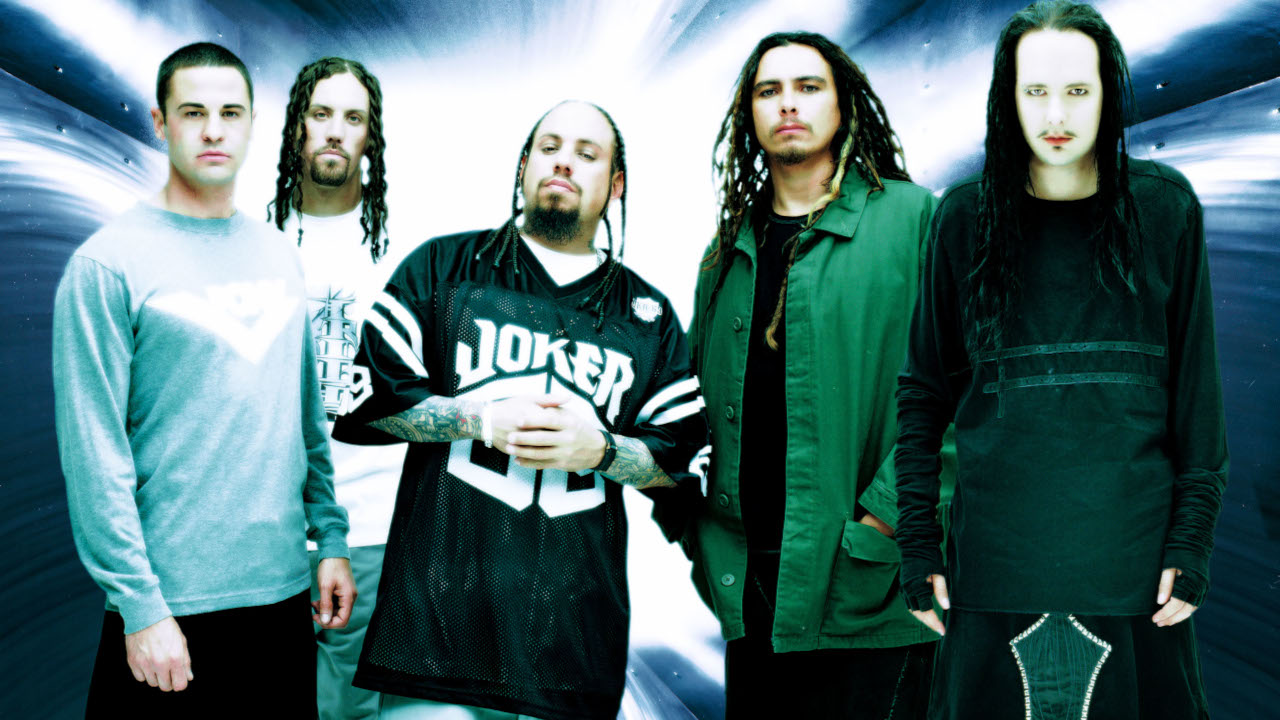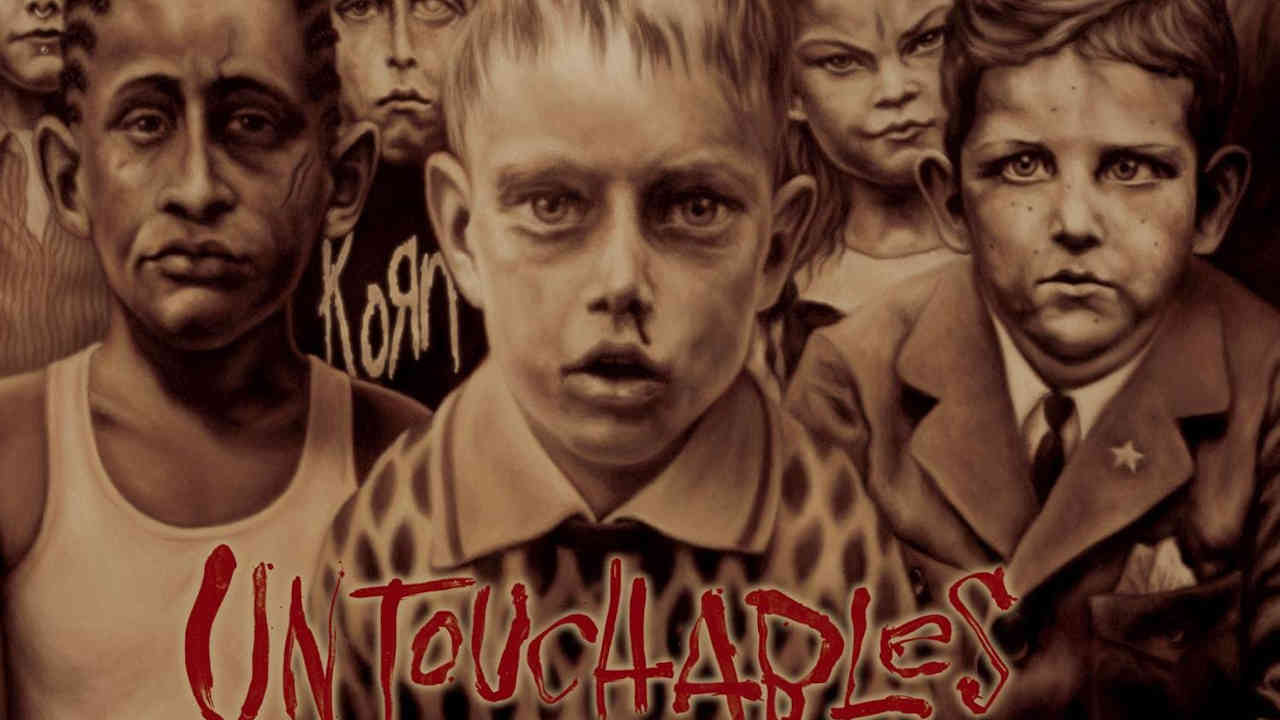Opinion has always been divided on Korn's fifth album, Untouchables, with even members of the band feeling conflicted about the record. What everyone does agree on however, was that upon completion it was the most expensive album in history, to the tune of around four million dollars. So what happened, exactly?
"Simple fuckin’ thing," says Jonathan Davis today, and you can practically hear his wry grin on the other end of the phone. "They say it cost around four million dollars to make. I’d say 3.1 of that was keeping our entire touring crew on retainer for two years. That was a dipshit move; we should have listened."
The way Jonathan discusses it, you'd think he'd found out out he could have got a better deal on his car insurance, rather than his band blowing through millions to make a record. But then, to him it was probably a worthy trade; Untouchables is his favourite Korn album, after all.
"It is!" he says, with such enthusiasm you'd think the clock had dialled back 20 years to when the album was first released. "It’s a very important record – one that couldn’t be made in this day and age. I call it the ‘heavy metal Asia’ because of the production and sound-quality… people use it to tune their speakers to this day. It’s our Dark Side Of The Moon, I love it. And that’s exactly what I told [producer] Michael Beinhom – ‘I want this to be our Dark Side Of The Moon’. He said ‘Cool, it’s gonna take a long time.’"
He wasn't kidding. Sessions for Untouchables lasted up to two and a half years, Michael going into microscopic detail to ensure every part of the recording was perfect. Even for Korn, the band who previously recorded with Ross Robinson, a producer who would literally punch and scratch them to ensure their playing sounded tortured, it was an endurance test.
"I wanted to fight [Michael]," Jonathan laughs. "I’d go in to do vocal melodies and he’d be like ‘Ew! What the fuck are you doing? Go home, you're shitty today.’ I can’t even count how many times that happened. My feelings were so hurt, but he knew I could do better and pushed me for greatness."
In 2002, it was exactly what Korn needed. The band had spearheaded the nu metal revolution in the mid-90s, opening the gates for a legion of boundary-pushing groups who redefined the look and sound of heavy metal. They had also spawned a procession of imitators, dismissively dubbed by their former producer Ross Robinson as "tracksuit metal".
1998's Follow The Leader had been hailed as a genre-defining masterpiece, while also taking the band to the top of the charts. Its 1999 follow-up Issues achieved similar commercial success, but was met with lukewarm critical response as reviewers felt the album was rushed and just rehashed old ideas (something we don't particularly agree with). With other nu metal bands now climbing the charts - including onetime Korn-kopyists Limp Bizkit - eyes were on Korn to see if they could again redefine the genre they helped popularise as a nu millennium dawned.
"When the nu metal thing first really took off, there were a billion Korns," Jonathan says. "But we didn’t care about how popular we were or how much people were paying attention – we just wanted to make good art."
These were the last days of Rome, so far as the hedonism of the past were concerned, and while Korn (or Jonathan, at least) had given up the sex and drugs that had characterised Follow The Leader, there was still plenty of excess to be found.
"Everyone was partying and I was the only sober one," Jonathan recalls (Head recently commented on how he was also "trying to get sober" around this time). "I locked myself in the master bedroom and wrote [Untouchables] all there. It wasn’t all booze and chicks and drugs by that point, it was just money. We could basically do whatever we wanted – we rented out three houses in Arizona just to write the record, then I started doing vocals and melodies in Canada. I didn’t like it there, I wasn’t vibing, so we moved, paying for lodging for everyone… It was crazy.”
Thankfully, the efforts paid off. With Michael pushing the band, Untouchables came together and was finally released on June 11, 2002. From the sludge-drenched opening notes of Here To Stay, to the creepy goth vibe of Make Believe ("my favourite song on the record," Jonathan says. "I still warm up with it now - if I can hit those notes I know my voice is good"), pulsing somp of Thoughtless and sleek chugger One More Time, the album saw Korn experimenting with the base elements of their sound whilst keeping the core unchanged.
Unfortunately, the ambitious creative process that had given birth to Untouchables didn't necessarily translate into commercial success; unlike its predecessors, it failed to reach Number 1 in the US, held off the top spot by Eminem's The Eminem Show. Although in fairness, there were mitigating circumstances, in so much as Korn had fallen victim to the blight of the 2000s music industry: piracy.
"It leaked four months before the release date, so that really fucked us." Jonathan says feelingly. "But in the end it was all worth it. The whole process, the nitpicking… it made such an amazing sound. It spawned my production passion – that’s all because of Michael. He got me singing with a vocal coach and I started taking so many lessons…Untouchables was when I really started to blossom as an artist."

Although Untouchables did not retain the top spot in the charts like its predecessors, it did prove Korn's continued capacity for evolution and growth. The America of 2002 was a very different world to the one the band had put Issues out into, a confluence of events darkening the horizon. While Korn were no strangers to exploring dark themes in their lyrics, they generally dealt with "anxiety, depression... a snapshot of where I was at," Jonathan explains. But Thoughtless was written in response to national events - namely the Columbine High School shooting in April 1999.
While Jonathan wasn't about to defend the shooters, he remembers hearing reports that they were bullied and recalling his own past. "I was beat down so often in school and there was no help," he says.
"I’d go to councillors, go to teachers and say ‘help me’ and they’d fuck with me, laugh and say it was because I was gay. They’d tell me to go to the gay councillor, who also happened to be my music teacher. But he sat me down and tried to actually help. It was a real failure of the school system. So I wrote from that sense of being so hurt and knowing there’s no help coming."
The song's music video - starring future Breaking Bad star Aaron Paul - also made it unambiguous what the song was about, albeit with a less violent outcome. "I’m not pro-revenge – it’s fucking horrible – but that’s where my mindset was at. The hell people put you through is unbelievable," Jonathan says. "In that time period it was very taboo, but I wanted to tackle the subject. It was a symbol of what was happening in America, but these days there’s a shooting almost every day. It’s fucking ridiculous."
Though initially written from a place of pain and anger, Thoughtless would later be reinvented when Evanescence covered it in 2004. "That cover is beautiful," Jonathan says happily. "They have a way of performing that in a very beautiful way. Ours is melodic, but it's also harsh and angry, so Amy [Lee]'s is beautiful and you can really hear what she brings to that."
Similarly, while the song was originally about pain and lashing out, over time it (like Korn themselves) has been embraced as a beacon for Korn fans who are struggling. We have to ask - how does it feel for Jonathan, knowing his band are offering comfort to people going through a tough time?
"It fucking feels great, it’s why I do what I do," Jonathan says happily. "I could probably retire happy now, but every time I see those kids faces, hear someone say ‘your band saved my life, it got me out of a really dark place’, that’s the reward I want. All the money and shit that comes with it is fine, but the real reward is touching someone on an emotional level with your art and I’m glad the misfits have an outlet. Fuck, I needed that – my bands were The Cure and Duran Duran, the new romantics shit, so to be that for someone else is incredible.”

